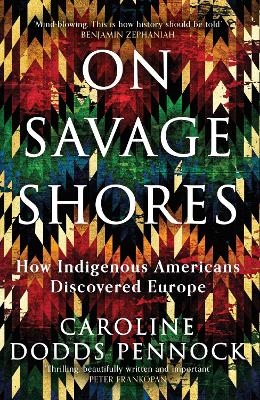
On Savage Shores
How Indigenous Americans Discovered Europe
Seiten
2023
Weidenfeld & Nicolson (Verlag)
978-1-4746-1691-1 (ISBN)
Weidenfeld & Nicolson (Verlag)
978-1-4746-1691-1 (ISBN)
A landmark work by the UK's only Aztec historian that shatters our previous Eurocentric understanding of the Age of Discovery by exploring how the great civilisations of the Americas - the Aztecs, Maya, Totonacs, Inuit and others - discovered Europe
A New Statesman Best Book of the Year 2023. A Waterstones Book of the Year 2023. An Economist Book of the Year. One of Smithsonian Magazine's Ten Best History Books of 2023. A BBC History Magazine Book of the Year 2023. One of History Workshop's 'Radical Reads' for 2023. Winner of the Voltaire Medal.
We have long been taught to presume that modern global history began when the 'Old World' encountered the 'New', when Christopher Columbus 'discovered' America in 1492. But, as Caroline Dodds Pennock conclusively shows in this groundbreaking book, for tens of thousands of Aztecs, Maya, Totonacs, Inuit and others - enslaved people, diplomats, explorers, servants, traders - the reverse was true: they discovered Europe. For them, Europe comprised savage shores, a land of riches and marvels, yet perplexing for its brutal disparities of wealth and quality of life, and its baffling beliefs. The story of these Indigenous Americans abroad is a story of abduction, loss, cultural appropriation, and, as they saw it, of apocalypse - a story that has largely been absent from our collective imagination of the times.
From the Brazilian king who met Henry VIII to the Aztecs who mocked up human sacrifice at the court of Charles V; from the Inuk baby who was put on show in a London pub to the mestizo children of Spaniards who returned 'home' with their fathers; from the Inuit who harpooned ducks on the Avon river to the many servants employed by Europeans of every rank: here are a people who were rendered exotic, demeaned, and marginalised, but whose worldviews and cultures had a profound impact on European civilisation. Drawing on their surviving literature and poetry and subtly layering European eyewitness accounts against the grain, Pennock gives us a sweeping account of the Indigenous American presence in, and impact on, early modern Europe.
A New Statesman Best Book of the Year 2023. A Waterstones Book of the Year 2023. An Economist Book of the Year. One of Smithsonian Magazine's Ten Best History Books of 2023. A BBC History Magazine Book of the Year 2023. One of History Workshop's 'Radical Reads' for 2023. Winner of the Voltaire Medal.
We have long been taught to presume that modern global history began when the 'Old World' encountered the 'New', when Christopher Columbus 'discovered' America in 1492. But, as Caroline Dodds Pennock conclusively shows in this groundbreaking book, for tens of thousands of Aztecs, Maya, Totonacs, Inuit and others - enslaved people, diplomats, explorers, servants, traders - the reverse was true: they discovered Europe. For them, Europe comprised savage shores, a land of riches and marvels, yet perplexing for its brutal disparities of wealth and quality of life, and its baffling beliefs. The story of these Indigenous Americans abroad is a story of abduction, loss, cultural appropriation, and, as they saw it, of apocalypse - a story that has largely been absent from our collective imagination of the times.
From the Brazilian king who met Henry VIII to the Aztecs who mocked up human sacrifice at the court of Charles V; from the Inuk baby who was put on show in a London pub to the mestizo children of Spaniards who returned 'home' with their fathers; from the Inuit who harpooned ducks on the Avon river to the many servants employed by Europeans of every rank: here are a people who were rendered exotic, demeaned, and marginalised, but whose worldviews and cultures had a profound impact on European civilisation. Drawing on their surviving literature and poetry and subtly layering European eyewitness accounts against the grain, Pennock gives us a sweeping account of the Indigenous American presence in, and impact on, early modern Europe.
Caroline Dodds Pennock is a Senior Lecturer in International History at the University of Sheffield and the UK's only Aztec historian. Her first book, BONDS OF BLOOD: GENDER, LIFECYCLE AND SACRIFICE IN AZTEC CULTURE (Palgrave Macmillan) won the Royal Historical Society's Gladstone Prize for 2008. She has appeared on TV programmes for broadcasters including the BBC, the Smithsonian Channel and Netflix, and has acted as a named historical consultant for several TV projects, as well as writing for popular publications including Scientific American, BBC History Magazine, BBC World Histories, BBC Knowledge Magazine and History Today.
| Erscheinungsdatum | 20.01.2023 |
|---|---|
| Zusatzinfo | 1 x 8 page colour inset |
| Verlagsort | London |
| Sprache | englisch |
| Maße | 154 x 232 mm |
| Gewicht | 440 g |
| Themenwelt | Geisteswissenschaften ► Geschichte ► Allgemeine Geschichte |
| Geschichte ► Teilgebiete der Geschichte ► Wirtschaftsgeschichte | |
| Sozialwissenschaften ► Ethnologie | |
| Sozialwissenschaften ► Soziologie | |
| ISBN-10 | 1-4746-1691-7 / 1474616917 |
| ISBN-13 | 978-1-4746-1691-1 / 9781474616911 |
| Zustand | Neuware |
| Haben Sie eine Frage zum Produkt? |
Mehr entdecken
aus dem Bereich
aus dem Bereich


